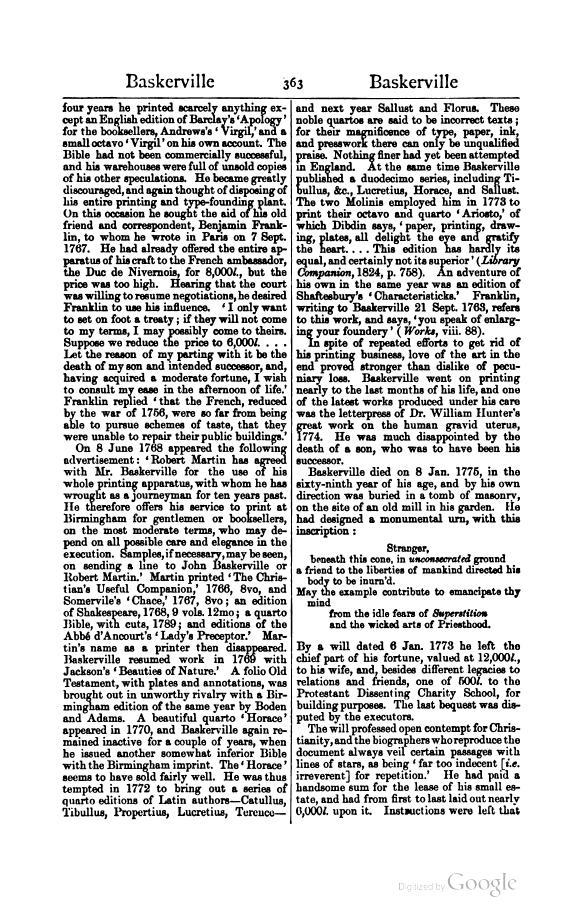four years he printed scarcely anything except an English edition of Barclay's ‘Apology’ for the booksellers, Andrews's ‘Virgil,’ and a small octavo ‘Virgil’ on his own account. The Bible had not been commercially successful, and his warehouses were full of unsold copies of his other speculations. He became greatly discouraged, and again thought of disposing of his entire printing and type-founding plant. On this occasion he sought the aid of his old friend and correspondent, Benjamin Franklin, to whom he wrote in Paris on 7 Sept. 1767. He had already offered the entire apparatus of his craft to the French ambassador, the Duc de Nivernois, for 8,000l., but the price was too high. Hearing that the court was willing to resume negotiations, he desired Franklin to use his influence. ‘I only want to set on foot a treaty; if they will not come to my terms, I may possibly come to theirs. Suppose we reduce the price to 6,000l. … Let the reason of my parting with it be the death of my son and intended successor, and, having acquired a moderate fortune, I wish to consult my ease in the afternoon of life.’ Franklin replied ‘that the French, reduced by the war of 1756, were so far from being able to pursue schemes of taste, that they were unable to repair their public buildings.’
On 8 June 1768 appeared the following advertisement: ‘Robert Martin has agreed with Mr. Baskerville for the use of his whole printing apparatus, with whom he has wrought as a journeyman for ten years past. He therefore offers his service to print at Birmingham for gentlemen or booksellers, on the most moderate terms, who may depend on all possible care and elegance in the execution. Samples, if necessary, may be seen, on sending a line to John Baskerville or Robert Martin.’ Martin printed ‘The Christian's Useful Companion,’ 1766, 8vo, and Somervile's ‘Chace,’ 1767, 8vo; an edition of Shakespeare, 1768, 9 vols. 12mo; a quarto Bible, with cuts, 1789; and editions of the Abbé d'Ancourt's ‘Lady's Preceptor.’ Martin's name as a printer then disappeared. Baskerville resumed work in 1769 with Jackson's ‘Beauties of Nature.’ A folio Old Testament, with plates and annotations, was brought out in unworthy rivalry with a Birmingham edition of the same year by Boden and Adams. A beautiful quarto ‘Horace’ appeared in 1770, and Baskerville again remained inactive for a couple of years, when he issued another somewhat inferior Bible with the Birmingham imprint. The ‘Horace’ seems to have sold fairly well. He was thus tempted in 1772 to bring out a series of quarto editions of Latin authors—Catullus, Tibullus, Propertius, Lucretius, Terence—and next year Sallust and Florus. These noble quartos are said to be incorrect texts; for their magnificence of type, paper, ink, and presswork there can only be unqualified praise. Nothing finer had yet been attempted in England. At the same time Baskerville published a duodecimo series, including Tibullus, &c., Lucretius, Horace, and Sallust. The two Molinis employed him in 1773 to print their octavo and quarto ‘Ariosto,’ of which Dibdin says, ‘paper, printing, drawing, plates, all delight the eye and gratify the heart. … This edition has hardly its equal, and certainly not its superior’ (Library Companion, 1824, p. 758). An adventure of his own in the same year was an edition of Shaftesbury's ‘Characteristicks.’ Franklin, writing to Baskerville 21 Sept. 1763, refers to this work, and says, ‘you speak of enlarging your foundery’ (Works, viii. 88).
In spite of repeated efforts to get rid of his printing business, love of the art in the end proved stronger than dislike of pecuniary loss. Baskerville went on printing nearly to the last months of his life, and one of the latest works produced under his care was the letterpress of Dr. William Hunter's great work on the human gravid uterus, 1774. He was much disappointed by the death of a son, who was to have been his successor.
Baskerville died on 8 Jan. 1775, in the sixty-ninth year of his age, and by his own direction was buried in a tomb of masonry, on the site of an old mill in his garden. He had designed a monumental urn, with this inscription:
Stranger,
beneath this cone, in unconsecrated ground
a friend to the liberties of mankind directed his body to be inurn'd.
May the example contribute to emancipate thy mind
from the idle fears of Superstition
and the wicked arts of Priesthood.
By a will dated 6 Jan. 1773 he left the chief part of his fortune, valued at 12,000l., to his wife, and, besides different legacies to relations and friends, one of 500l. to the Protestant Dissenting Charity School, for building purposes. The last bequest was disputed by the executors.
The will professed open contempt for Christianity, and the biographers who reproduce the document always veil certain passages with lines of stars, as being ‘far too indecent [i.e irreverent] for repetition.’ He had paid a handsome sum for the lease of his small estate, and had from first to last laid out nearly 6,000l. upon it. Instructions were left that
